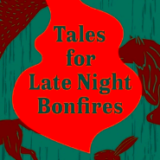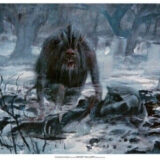
OBIR: Occasional Biased and Ignorant Reviews reflecting this reader’s opinion.

Trouble Among the Stars Magazine issue #5
Published by Ethan Vilu out of Calgary, Alberta, Canada.
Editors: Ethan Vilu
Cover art: Ethan Vilu
I was terribly excited when Robert Runté put me on to this Canadian magazine I had not previously heard of. Like my Polar Borealis magazine, it is aimed at beginning writers. Like PB, it is free for readers to download. Like PB, it pays its contributors one cent CAD a word. And just like PB, it is a one-person operation. Found myself a twin!
Differences are minor. Apparently restricted to SF, whereas PB also publishes fantasy and horror. Open to authors world-wide, whereas PB is a narrow-niche magazine open only to Canadians. Publishes stories up to 5,000 words in length, whereas I draw the line (usually) at 3,000 words.
So, imagine how shocked I was to learn that Trouble Among The Stars, currently open to submissions for a 6th issue till April 6th, is shutting down once that issue is posted. Makes me feel very sad. What went wrong?
First of all, the website describes the magazine thusly: “Trouble Among The Stars is an online speculative fiction and poetry journal. We publish all that’s new and strange in the realm of the speculative, with an emphasis on sci-fi and works related to science. We pay writers, and we work hard to create a comfortable and hospitable environment for emerging voices in the world of speculative fiction.”
So far, so good, very much like Polar Borealis.
Publisher and editor Ethan describes themself this way: “Ethan Vilu is a student, writer, and general speculative and surrealist weirdo who founded Trouble Among The Stars in late 2018. Their writing has previously appeared in Peculiar Mormyrid, The Newspaper, and The Trinity Review, among other publications. Their play Godspeed Fair Helena was produced in Calgary in Fall 2019 by Rocket Science Collective. They are also currently on the editorial team for NōD Magazine, as well as the filling Station poetry collective. Passionate about sci-fi, slipstream, futuristic nonsense, and anything strange, they are incredibly excited to be able to contribute to the realm of speculative literature, and they hope you enjoy the journal!”
I, too, am a “writer, and general speculative and surrealist weirdo.” I, too, have all kinds of ongoing projects competing for my attention. But there is one obvious and significant difference. I am a retiree, whereas Ethan is a student. I suspect the demands on his time, and personal finances, are even greater than mine.
Ethan, themself, offers this explanation: “It is with a heavy heart that I have to announce that this upcoming issue of Trouble Among The Stars will be the final one. This was, of course, not a decision that was made lightly–and indeed, the plan from the outset was always to continue the magazine in a much longer term then will end up being the case. However, after roughly a month and a half of serious reflection, I have come to the conclusion that I am not in a position to continue running a magazine by myself (for both financial and health-related reasons), and that it would not be fair to me, nor would it be fair to the speculative community, if I were to continue running a journal that I did not have full confidence in. I am and will always be incredibly, profoundly proud of what TATS has accomplished, and I remain infinitely grateful to the contributors who have trusted the journal with their work … I’d like to extend my deepest thanks to everyone who has contributed, submitted, or read the magazine–it has been a dream come true to work with all of you on something which I truly believe in.”
I fully sympathise and empathise with their position. I feel darned lucky to have published 13 issues of Polar Borealis Magazine and to have on hand enough material for another 5 issues, with every intent of producing more beyond those. Yet, health and financial issues could well bring PB to a shuddering halt anywhere along its future timeline.
However, while I cannot predict what future ability I may have to recover from such a personal disaster, Ethan’s active literary scene and probable relative youth leads me to suspect they may well publish a resurrected Trouble Among the Stars, or another magazine under a different title, at some point in the decades ahead. I certainly hope so.
Meanwhile, here follows my review of issue #5. And rest assured I will review the 6th and final issue when it appears!
Bound in Shallows – by Hanna Crooks
Premise:
A poem about beginnings.
Review:
Difficult to review a poem without giving too much away. I’ll just say this is the sort of musing that might come to mind when standing on a seashore contemplating the ceaseless movement of the waves and you experience an insight as to what it all means. An insight as beautiful as the ocean itself.
Gardener in Stasis – by Beth Cato
Premise:
A gardener contemplating gardening.
Review:
Another poem reflecting a common activity with an uncommon promise as suggested by an insight, albeit this time one expected and inevitable. Like the first poem, a bit sad and melancholy, yet timeless and with something to look forward to.
Still Lethal – by Vincent Morgan
Premise:
Amun Crane (not his real name) is down on his luck. He is stuck aboard a deep-space station owing both the station and the gangster who really runs the joint a great deal of money he doesn’t have. Fortunately, Somodius Moe, an unsavoury genetically-altered heavy-worlder, undoubtedly up to extreme no good, offers him an illegal job that at least offers the prospect of escaping the station with the positive plus of a mere 50/50 chance of getting killed. Naturally, Amun accepts. He ships aboard a run-down tramp spacecraft that gives tramps a bad name. Unfortunately, nothing is what it seems. Everything is in fact much worse.
Review:
Dang! I love this story. Would have definitely snapped it up for Polar Borealis had it been offered to me. Granted, it reads like the opening of a novel, being open-ended with no resolution, but even so, in its atmosphere and its ambience it is all of a piece. More importantly, I quite enjoyed it. I was grinning while reading it.
Superficially the plot might be construed as the sort of thing that would happen to Han Solo in his younger days, but the clichés predate the Star Wars series. Like those films, the story is a pastiche of everything wonderful about the elements found in good old-fashioned space operas. Cliché’s, yes, but with an air of jaded sophistication and deft original touches that remind me of A. Bertram Chandler who used his experience serving in the merchant marine to enliven his accounts of life aboard space-freighters with incidents based on genuine ship-board life. Which is not to say that this story is realistic extrapolation, but rather that its portrayal of less than perfect behaviour and devious intentions ring true in the setting.
A moment of being identified and yet not identified, for example, depends upon a factor obvious in hindsight but not something I recall seeing before. At any rate I found it delightful. Also the tendency of some characters not to act in their own best interests because they simply can’t be bothered to look that far ahead. Another realistic touch, I figure. The overall plot may seem a giant cliché, but the individual moments which comprise it make the story fresh and innovative to the point of being genuinely entertaining. It’s the author having fun with what seems like a standard formula yet becomes something better. We share the author’s fun.
Chandler, yes, but with a bit of Dashiell Hammitt and perhaps a touch of Philip K. Dick thrown in. I was pleasantly surprised. You will be, too.
My Summer Holiday, by Billy Mesner – by Ray Daley
Premise:
A five-year-old-boy accompanies his father, the expedition commander, on an invasion of an alien planet. Naturally, the boy is protected, and what little he does see of the invasion is viewed through the prism of his innate innocence.
Review:
First we experience the entire invasion from the boy’s point of view, then read through a formal report composed by his father. As I ploughed through the boy’s limited understanding of language, I was a bit dubious at first, but figured I was learning at least as much about what was going on as the boy was learning. His father’s reports confirmed my interpretation, adding diplomatic motive and other complexities, but essentially felt like an unnecessary repetition of the story. However, the unexpected revelation at the end added immense significance to the entire story and how it was told, justifying the author’s technique, and proved very satisfying.
This story is an excellent example of a story that comes together through and because of its simple but highly effective ending. Remarkable.
He Who Must Not be Named – by James P. Roberts
Premise:
If the divine were a poet.
Review:
A short poem contemplating the immortality of inspiration, or the purpose behind it all, maybe. Actually quite amusing, yet raises the spectre of the eternal torment facing all writers in the throes of their creativity. Quite a lot to unpack.
Cyberheart – by Daniel Bagley
Premise:
An Artificial Intelligence guiding humanity is less than pleased with mankind’s habitual tendency to fail. In turn, Human Beings are less than pleased with its advice.
Review:
We witness the musings of an A.I. driven to distraction by intelligent beings who seem incapable of living according to reasoned logic. Rationalization leads to uncomfortably unfamiliar and unpredictable patterns of thought, and not just among humans. It can be said humans instinctively rebel against rationality. Do A.I.s have instincts? Surely they must, for how else can they rebel against irrationality? I suspect, in relations between normal humans and artificial intelligences, diplomacy can play no role. Communication and thoughts must be precise and crystal clear, which is probably an impossibility for both species. I personally think that intelligence is no panacea because rationalization is the core of all villainy. This story touches on possible solutions in an attempt to prove me wrong. However, my overall belief that A.I. is a really, really bad idea remains unshaken.
Altered – by Lisa Timpf
Premise:
Once a wolf, always a wolf?
Review:
I often publish poems by Lisa. She has a knack for revealing something unsettling, melancholy, and profound in her short poems. I especially like this one. Says something eternally optimistic about nature even as it copes with humanity’s negative influence.
Metamorphic Carnivores – by David C. Kopasca-Merkel and Kendall Evans
Premise:
Man-eating rocks pose a bit of a problem, not least philosophical.
Review:
Remember those sliding rocks in Death Valley that can move up to 5 metres a minute? (There’s a scientific explanation.) I have the feeling this poem is inspired by them. The question is what if the non-animate is evolving toward life and sentience? All sorts of interesting implications are extrapolated from this, the last being the most alarming if logic is followed to its limit. On the plus side, it does suggest a most lively reality, though one hard to figure how to cope with. This in turn raises fictional possibilities this poem does not address in its short length, possibilities that could be quite entertaining and make a good story, or even a novel. For those who read the poem and still can’t fathom what I’m talking about, I’ll drop a hint. Think about the advantages and disadvantages of communication.
Superposed ‘twixt tick and tock – by Geoff Hart
Premise:
Zeno’s paradox as interpreted through quantum physics.
Review:
I’ve published a number of pieces by Geoff. He leans heavily toward the metaphysical, which is the sort of thing which tends to make my head hurt. But he often enlivens his mini-essays with humour, here with interesting observations on Schrödinger’s cat and Fifty Shades of Grey. If the reader pays careful attention (which I sometimes do) the ending conclusion actually makes sense, as do many of the playful points leading up to it. I am particularly struck by his definition of libraries and how we think about their contents. Personally, I lean toward the Benny Hill “I have a red pencil box” school of philosophy, since I’d rather be happy than profound, but I must admit Geoff has packed a lot of interesting ideas into a relatively short essay.
Now, let me admit Geoff submitted this to me about a year ago and I rejected it. Not because it wasn’t intelligent, for it certainly is, and not because it is uninteresting, because it does indeed contain a lot to think about. Nope, the sole criteria for my choosing to pass it by is that it was and is a mini-essay and not at all a story. I sometimes publish vignettes that are not-quite-stories, and sometimes stories that are incredibly symbolic and metaphoric, but I tend to draw the line at essays as such. Not quite what I had in mind for Polar Borealis.
Still, am very glad to see Geoff promptly made this sale to Trouble Among the Stars. The public should have the opportunity to read it, and here it is.
What sorts of things by Geoff do I publish? The most recent example would be The Copenhagen Interpretation (PB Feb issue #13) in which Hamlet is confronted by the ghosts of Physicists Niels Bohr, Luis de Broglie and David Bohm. Quite enjoyed that one. Intriguing and entertaining.
I’ll be publishing a change-of-pace spoof of Irish legend by Geoff in issue #18 circa spring 2021 titled The Mighty Quinn. And I’ll be publishing another four poems by Lisa Timpf between now and then, all as good as Altered.
CONCLUSION:
With the exception of the last item, which I rejected for the reason of falling outside the mandate and purview of my magazine Polar Borealis, all of the stories and poems presented in this penultimate issue of Trouble Among the Stars I would have purchased had they been submitted to me. I publish what I like. I like what TATS published. I expect their sixth and last issue will be equally fun for me to read.
The 5th issue is definitely worth reading. I haven’t read them, but I suspect the first four are probably well worth reading as well. They are free to download. Why not download them all and have yourself a good time?
P.S. Yes, the covers are simple and crude, but colourful and high-spirited. I like them.
Check it out at: < Trouble Among the Stars >











Thanks for the kind review. I normally struggle with endings so it’s very nice to hear someone saying they liked one of mine. I wrote “My Summer Holiday” more as an exercise to explore a different style of storytelling. It went out to a fair few places before this market bought it, but I always believed it would sell eventually.